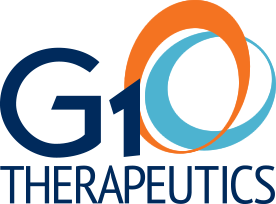
G1 Therapeutics Announces Positive Results In Cancer Trial

Research Triangle Park-based clinical-stage biopharmaceutical company G1 Therapeutics has reported more positive results for its investigational oncology drug, trilaciclib.
The company said a randomized Phase 2 clinical trial demonstrated that trilaciclib -- when used with chemotherapy -- improved the progression-free survival rate of patients with metastatic triple-negative breast cancer (mTNBC). They remained on the therapy longer than with chemotherapy-only treatments, and experienced no trilaciclib-related serious adverse effects.
Trilaciclib is a potential first-in-class treatment, administered before chemotherapy, to protect bone marrow cells – a process known as myelopreservation -- and immune system function during chemotherapy. It is a short-acting intravenous inhibitor of CDK4/6 -- two enzymes involved in cancer formation.
The trial enrolled 102 patients with mTNBC who had received no more than two prior lines of therapy. It administered a chemotherapy regimen of gemcitabine and carboplatin (GC) to all patients. They were randomized to receive GC only, or GC plus one of two dosing schedules of trilaciclib -- either on the day of chemotherapy, or on the day prior to and the day of chemotherapy.
A combined analysis of patients showed a progression-free survival rate of 5.4 months in the GC-only arm and 7.9 months for patients who also received trilaciclib. The number of patients who exhibited myelosuppression was similar across all three arms of the trial. And, when results were adjusted for the duration of chemotherapy, patients receiving trilaciclib experienced myelopreservation benefits.
“In a setting such as metastatic triple-negative breast cancer where chemotherapy is dosed until disease progression, trilaciclib has the potential to deliver both multi-lineage myelopreservation and anti-tumor efficacy benefits to patients,” said Raj Malik, M.D., G1 Therapeutics’ chief medical officer and senior vice president for R&D. “In this trial we observed promising early progression-free survival results favoring trilaciclib, as well as myelopreservation benefits across neutrophils, red blood cells, platelets and lymphocytes.”
Trilaciclib has reported positive results in two other Phase 2 clinical studies this quarter as a treatment for first-line small cell lung cancer. The first trial used trilaciclib with chemotherapy and the second one combined the drug with chemotherapy and checkpoint inhibitor,Tecentriq.
G1 Therapeutics is advancing three clinical-stage programs—trilaciclib, lerociclib and G1T48—to find more effective combination treatments for oncology patients. The company focuses on the discovery, development and delivery of innovative therapies to improve the lives of those who suffer from cancer.
G1 is a 2008 spin-out of the University of North Carolina at Chapel Hill. The company raised $108 million in an initial public offering of stock in 2017 after raising more than $95 million in three rounds of venture capital funding. The North Carolina Biotechnology Center provided two early-stage loans totaling $500,000 that G1 CEO Mark Velleca, M.D., Ph.D., said were “crucial” to positioning G1 for its follow-on funding.
